University Residential Trip: A People & Development Reflective Essay
VerifiedAdded on 2023/01/19
|12
|3460
|45
Essay
AI Summary
This essay is a reflective account of a student's experience during a university residential trip, focusing on leadership, teamwork, and personal development. The student, a business management student, details their initial anxieties and challenges faced, particularly in a business simulation task and a high-stakes physical activity. The essay explores the student's struggles with low self-esteem, perfectionism, and fear of failure, and how these were confronted through teamwork and pushing personal boundaries. The student reflects on the importance of communication, self-determination, and the impact of past experiences. The essay analyzes the significance of overcoming fears, embracing new experiences, and the benefits of teamwork, drawing on relevant research, models, and personal experiences. The student highlights the development of self-confidence and a willingness to take on new challenges after the residential trip, and the student's transformation in terms of leadership, self-belief, and approach to future challenges.
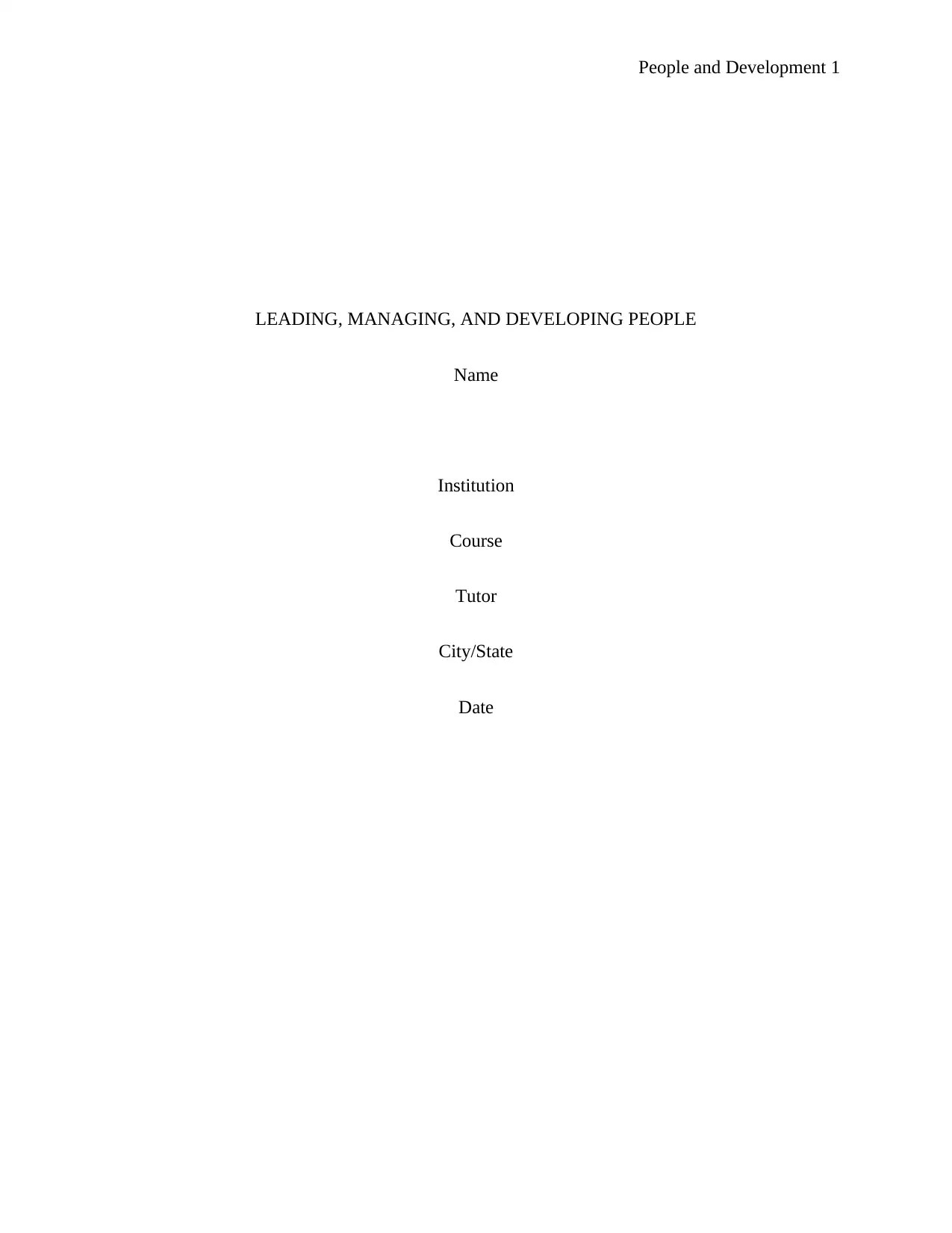
People and Development 1
LEADING, MANAGING, AND DEVELOPING PEOPLE
Name
Institution
Course
Tutor
City/State
Date
LEADING, MANAGING, AND DEVELOPING PEOPLE
Name
Institution
Course
Tutor
City/State
Date
Paraphrase This Document
Need a fresh take? Get an instant paraphrase of this document with our AI Paraphraser
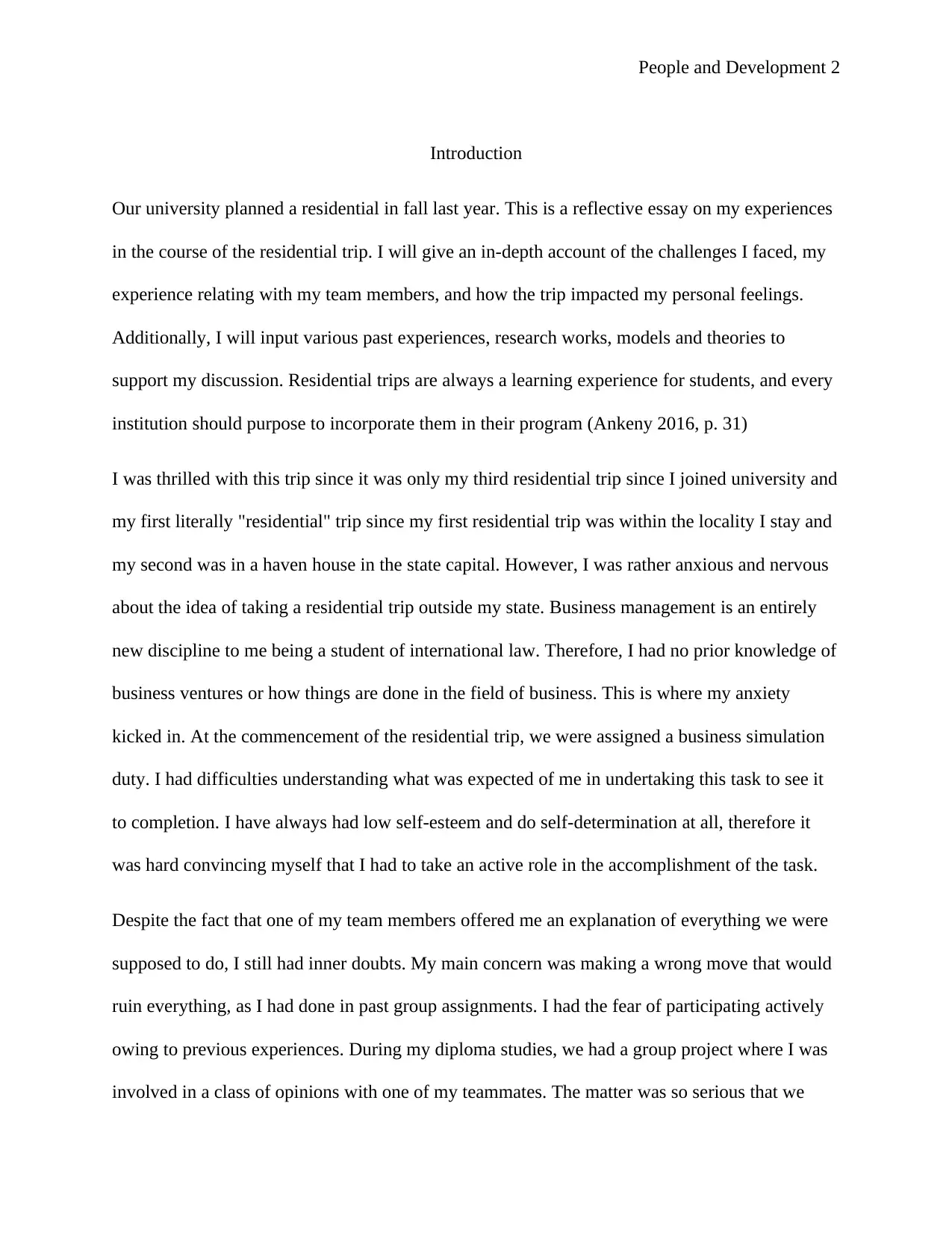
People and Development 2
Introduction
Our university planned a residential in fall last year. This is a reflective essay on my experiences
in the course of the residential trip. I will give an in-depth account of the challenges I faced, my
experience relating with my team members, and how the trip impacted my personal feelings.
Additionally, I will input various past experiences, research works, models and theories to
support my discussion. Residential trips are always a learning experience for students, and every
institution should purpose to incorporate them in their program (Ankeny 2016, p. 31)
I was thrilled with this trip since it was only my third residential trip since I joined university and
my first literally "residential" trip since my first residential trip was within the locality I stay and
my second was in a haven house in the state capital. However, I was rather anxious and nervous
about the idea of taking a residential trip outside my state. Business management is an entirely
new discipline to me being a student of international law. Therefore, I had no prior knowledge of
business ventures or how things are done in the field of business. This is where my anxiety
kicked in. At the commencement of the residential trip, we were assigned a business simulation
duty. I had difficulties understanding what was expected of me in undertaking this task to see it
to completion. I have always had low self-esteem and do self-determination at all, therefore it
was hard convincing myself that I had to take an active role in the accomplishment of the task.
Despite the fact that one of my team members offered me an explanation of everything we were
supposed to do, I still had inner doubts. My main concern was making a wrong move that would
ruin everything, as I had done in past group assignments. I had the fear of participating actively
owing to previous experiences. During my diploma studies, we had a group project where I was
involved in a class of opinions with one of my teammates. The matter was so serious that we
Introduction
Our university planned a residential in fall last year. This is a reflective essay on my experiences
in the course of the residential trip. I will give an in-depth account of the challenges I faced, my
experience relating with my team members, and how the trip impacted my personal feelings.
Additionally, I will input various past experiences, research works, models and theories to
support my discussion. Residential trips are always a learning experience for students, and every
institution should purpose to incorporate them in their program (Ankeny 2016, p. 31)
I was thrilled with this trip since it was only my third residential trip since I joined university and
my first literally "residential" trip since my first residential trip was within the locality I stay and
my second was in a haven house in the state capital. However, I was rather anxious and nervous
about the idea of taking a residential trip outside my state. Business management is an entirely
new discipline to me being a student of international law. Therefore, I had no prior knowledge of
business ventures or how things are done in the field of business. This is where my anxiety
kicked in. At the commencement of the residential trip, we were assigned a business simulation
duty. I had difficulties understanding what was expected of me in undertaking this task to see it
to completion. I have always had low self-esteem and do self-determination at all, therefore it
was hard convincing myself that I had to take an active role in the accomplishment of the task.
Despite the fact that one of my team members offered me an explanation of everything we were
supposed to do, I still had inner doubts. My main concern was making a wrong move that would
ruin everything, as I had done in past group assignments. I had the fear of participating actively
owing to previous experiences. During my diploma studies, we had a group project where I was
involved in a class of opinions with one of my teammates. The matter was so serious that we
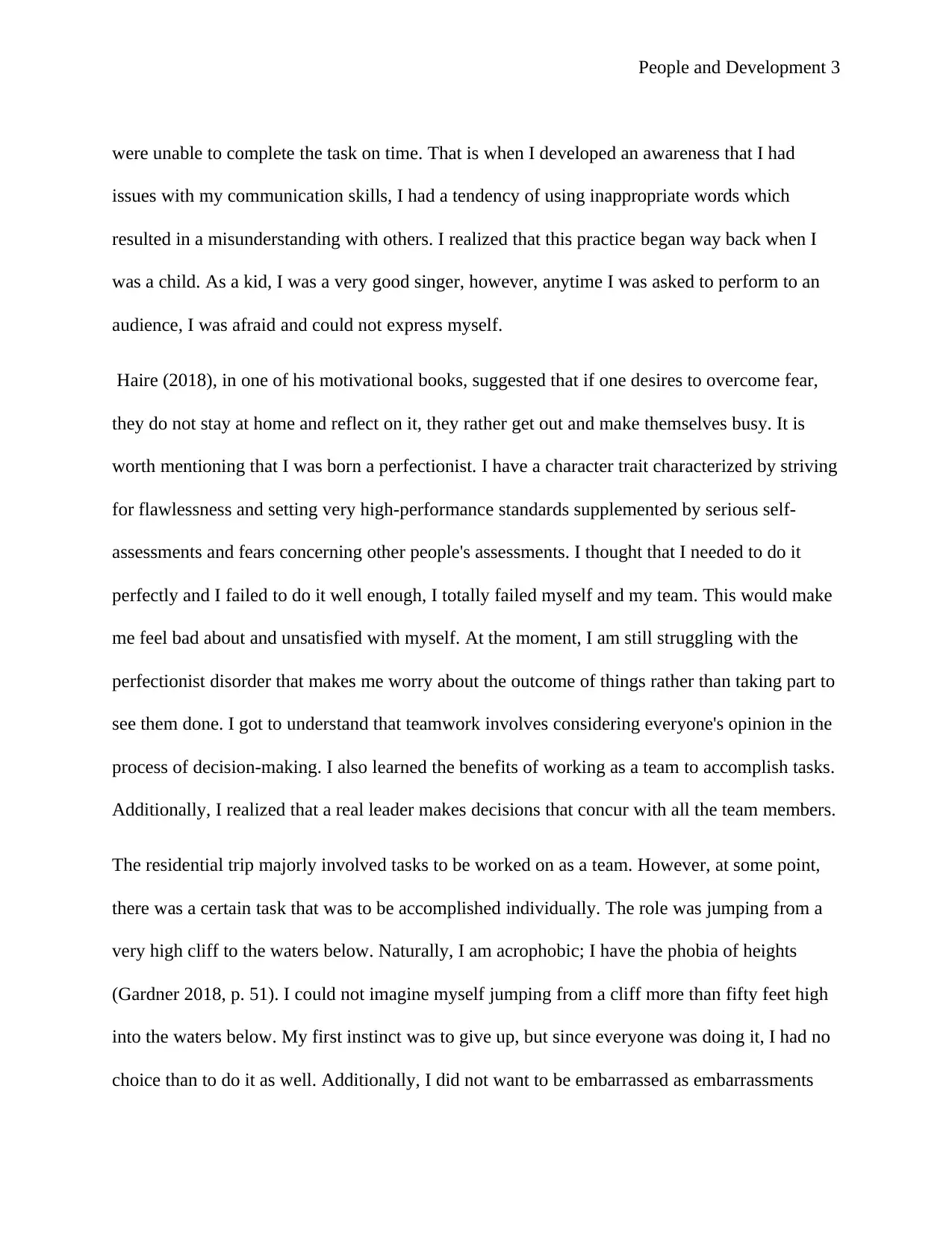
People and Development 3
were unable to complete the task on time. That is when I developed an awareness that I had
issues with my communication skills, I had a tendency of using inappropriate words which
resulted in a misunderstanding with others. I realized that this practice began way back when I
was a child. As a kid, I was a very good singer, however, anytime I was asked to perform to an
audience, I was afraid and could not express myself.
Haire (2018), in one of his motivational books, suggested that if one desires to overcome fear,
they do not stay at home and reflect on it, they rather get out and make themselves busy. It is
worth mentioning that I was born a perfectionist. I have a character trait characterized by striving
for flawlessness and setting very high-performance standards supplemented by serious self-
assessments and fears concerning other people's assessments. I thought that I needed to do it
perfectly and I failed to do it well enough, I totally failed myself and my team. This would make
me feel bad about and unsatisfied with myself. At the moment, I am still struggling with the
perfectionist disorder that makes me worry about the outcome of things rather than taking part to
see them done. I got to understand that teamwork involves considering everyone's opinion in the
process of decision-making. I also learned the benefits of working as a team to accomplish tasks.
Additionally, I realized that a real leader makes decisions that concur with all the team members.
The residential trip majorly involved tasks to be worked on as a team. However, at some point,
there was a certain task that was to be accomplished individually. The role was jumping from a
very high cliff to the waters below. Naturally, I am acrophobic; I have the phobia of heights
(Gardner 2018, p. 51). I could not imagine myself jumping from a cliff more than fifty feet high
into the waters below. My first instinct was to give up, but since everyone was doing it, I had no
choice than to do it as well. Additionally, I did not want to be embarrassed as embarrassments
were unable to complete the task on time. That is when I developed an awareness that I had
issues with my communication skills, I had a tendency of using inappropriate words which
resulted in a misunderstanding with others. I realized that this practice began way back when I
was a child. As a kid, I was a very good singer, however, anytime I was asked to perform to an
audience, I was afraid and could not express myself.
Haire (2018), in one of his motivational books, suggested that if one desires to overcome fear,
they do not stay at home and reflect on it, they rather get out and make themselves busy. It is
worth mentioning that I was born a perfectionist. I have a character trait characterized by striving
for flawlessness and setting very high-performance standards supplemented by serious self-
assessments and fears concerning other people's assessments. I thought that I needed to do it
perfectly and I failed to do it well enough, I totally failed myself and my team. This would make
me feel bad about and unsatisfied with myself. At the moment, I am still struggling with the
perfectionist disorder that makes me worry about the outcome of things rather than taking part to
see them done. I got to understand that teamwork involves considering everyone's opinion in the
process of decision-making. I also learned the benefits of working as a team to accomplish tasks.
Additionally, I realized that a real leader makes decisions that concur with all the team members.
The residential trip majorly involved tasks to be worked on as a team. However, at some point,
there was a certain task that was to be accomplished individually. The role was jumping from a
very high cliff to the waters below. Naturally, I am acrophobic; I have the phobia of heights
(Gardner 2018, p. 51). I could not imagine myself jumping from a cliff more than fifty feet high
into the waters below. My first instinct was to give up, but since everyone was doing it, I had no
choice than to do it as well. Additionally, I did not want to be embarrassed as embarrassments
⊘ This is a preview!⊘
Do you want full access?
Subscribe today to unlock all pages.

Trusted by 1+ million students worldwide
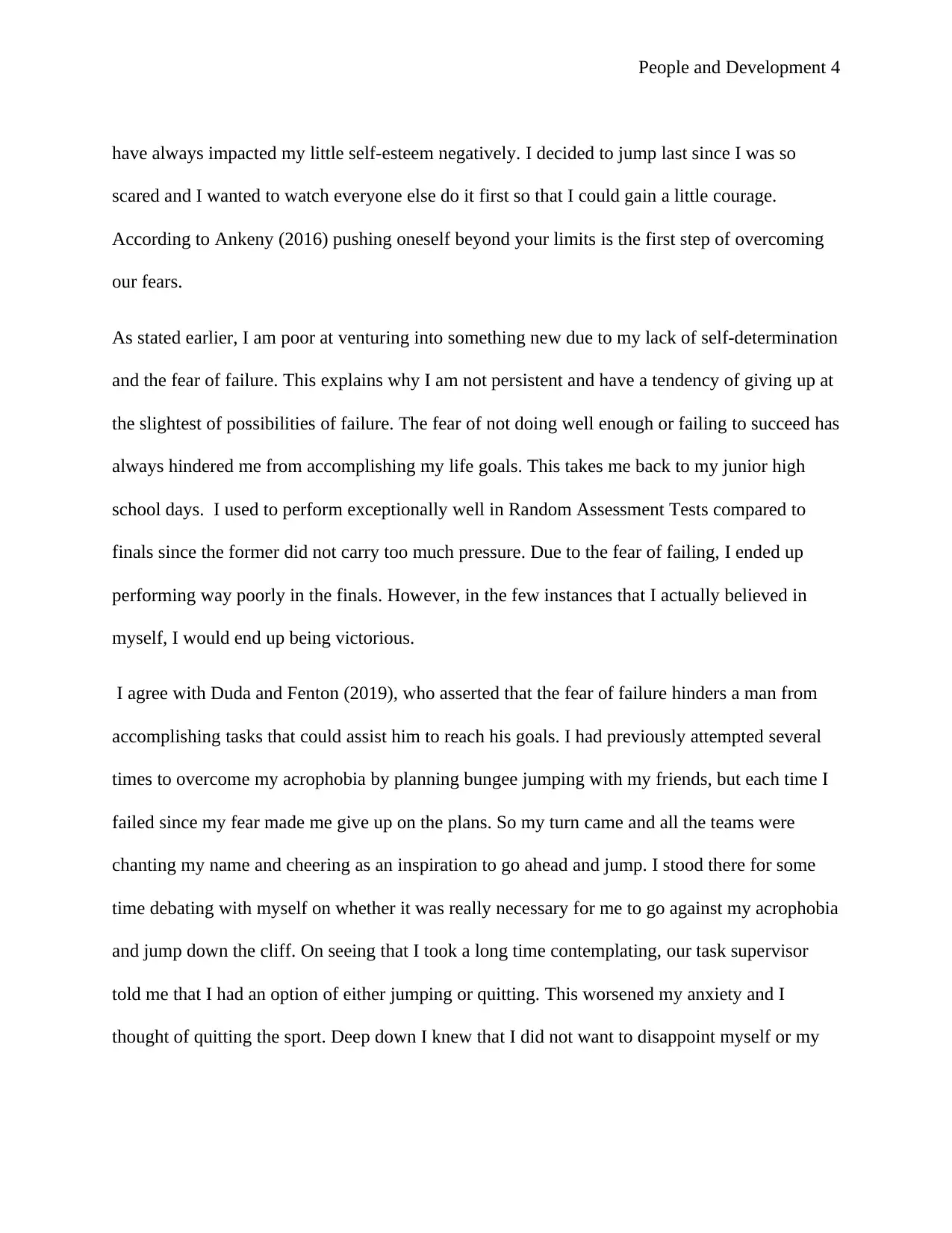
People and Development 4
have always impacted my little self-esteem negatively. I decided to jump last since I was so
scared and I wanted to watch everyone else do it first so that I could gain a little courage.
According to Ankeny (2016) pushing oneself beyond your limits is the first step of overcoming
our fears.
As stated earlier, I am poor at venturing into something new due to my lack of self-determination
and the fear of failure. This explains why I am not persistent and have a tendency of giving up at
the slightest of possibilities of failure. The fear of not doing well enough or failing to succeed has
always hindered me from accomplishing my life goals. This takes me back to my junior high
school days. I used to perform exceptionally well in Random Assessment Tests compared to
finals since the former did not carry too much pressure. Due to the fear of failing, I ended up
performing way poorly in the finals. However, in the few instances that I actually believed in
myself, I would end up being victorious.
I agree with Duda and Fenton (2019), who asserted that the fear of failure hinders a man from
accomplishing tasks that could assist him to reach his goals. I had previously attempted several
times to overcome my acrophobia by planning bungee jumping with my friends, but each time I
failed since my fear made me give up on the plans. So my turn came and all the teams were
chanting my name and cheering as an inspiration to go ahead and jump. I stood there for some
time debating with myself on whether it was really necessary for me to go against my acrophobia
and jump down the cliff. On seeing that I took a long time contemplating, our task supervisor
told me that I had an option of either jumping or quitting. This worsened my anxiety and I
thought of quitting the sport. Deep down I knew that I did not want to disappoint myself or my
have always impacted my little self-esteem negatively. I decided to jump last since I was so
scared and I wanted to watch everyone else do it first so that I could gain a little courage.
According to Ankeny (2016) pushing oneself beyond your limits is the first step of overcoming
our fears.
As stated earlier, I am poor at venturing into something new due to my lack of self-determination
and the fear of failure. This explains why I am not persistent and have a tendency of giving up at
the slightest of possibilities of failure. The fear of not doing well enough or failing to succeed has
always hindered me from accomplishing my life goals. This takes me back to my junior high
school days. I used to perform exceptionally well in Random Assessment Tests compared to
finals since the former did not carry too much pressure. Due to the fear of failing, I ended up
performing way poorly in the finals. However, in the few instances that I actually believed in
myself, I would end up being victorious.
I agree with Duda and Fenton (2019), who asserted that the fear of failure hinders a man from
accomplishing tasks that could assist him to reach his goals. I had previously attempted several
times to overcome my acrophobia by planning bungee jumping with my friends, but each time I
failed since my fear made me give up on the plans. So my turn came and all the teams were
chanting my name and cheering as an inspiration to go ahead and jump. I stood there for some
time debating with myself on whether it was really necessary for me to go against my acrophobia
and jump down the cliff. On seeing that I took a long time contemplating, our task supervisor
told me that I had an option of either jumping or quitting. This worsened my anxiety and I
thought of quitting the sport. Deep down I knew that I did not want to disappoint myself or my
Paraphrase This Document
Need a fresh take? Get an instant paraphrase of this document with our AI Paraphraser
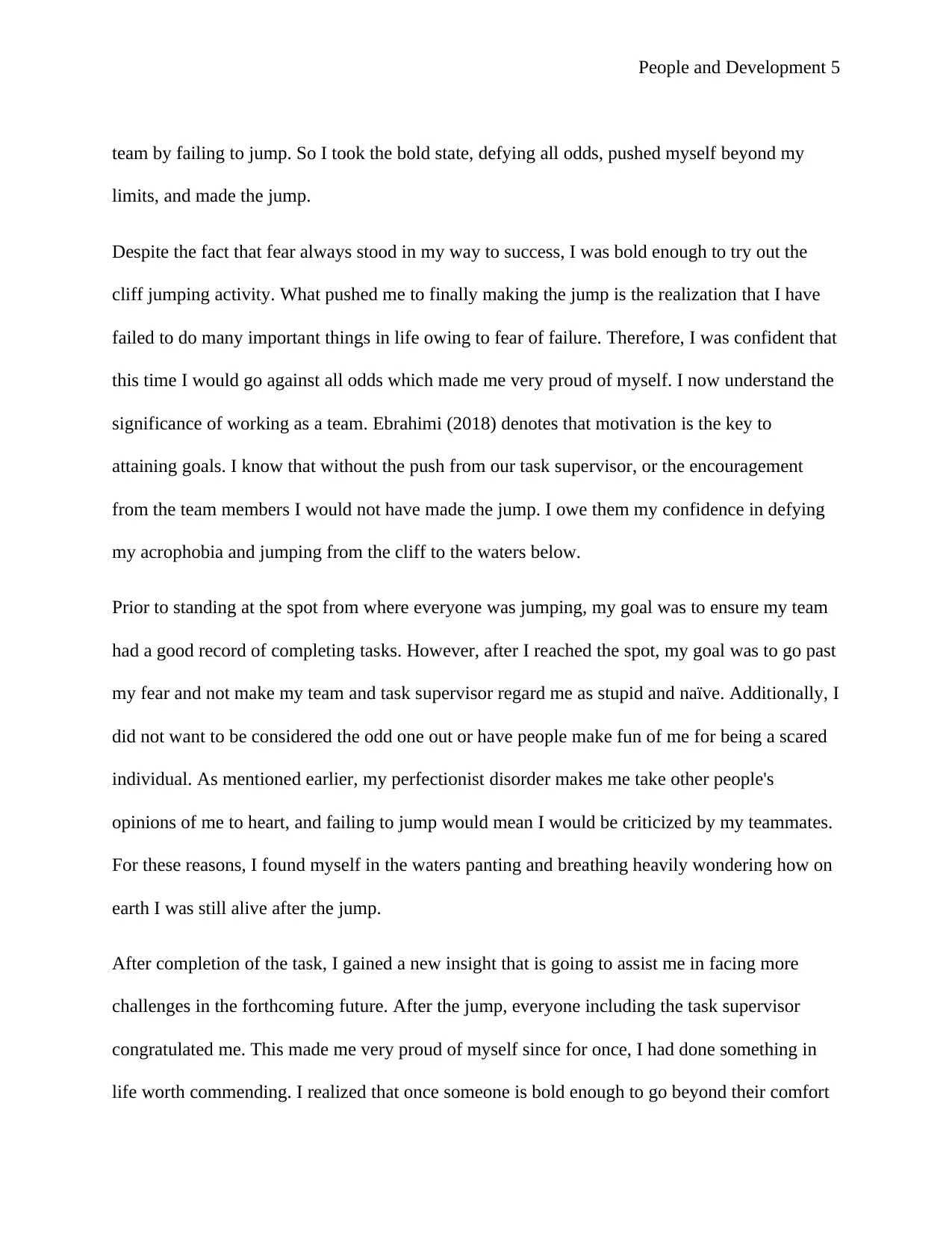
People and Development 5
team by failing to jump. So I took the bold state, defying all odds, pushed myself beyond my
limits, and made the jump.
Despite the fact that fear always stood in my way to success, I was bold enough to try out the
cliff jumping activity. What pushed me to finally making the jump is the realization that I have
failed to do many important things in life owing to fear of failure. Therefore, I was confident that
this time I would go against all odds which made me very proud of myself. I now understand the
significance of working as a team. Ebrahimi (2018) denotes that motivation is the key to
attaining goals. I know that without the push from our task supervisor, or the encouragement
from the team members I would not have made the jump. I owe them my confidence in defying
my acrophobia and jumping from the cliff to the waters below.
Prior to standing at the spot from where everyone was jumping, my goal was to ensure my team
had a good record of completing tasks. However, after I reached the spot, my goal was to go past
my fear and not make my team and task supervisor regard me as stupid and naïve. Additionally, I
did not want to be considered the odd one out or have people make fun of me for being a scared
individual. As mentioned earlier, my perfectionist disorder makes me take other people's
opinions of me to heart, and failing to jump would mean I would be criticized by my teammates.
For these reasons, I found myself in the waters panting and breathing heavily wondering how on
earth I was still alive after the jump.
After completion of the task, I gained a new insight that is going to assist me in facing more
challenges in the forthcoming future. After the jump, everyone including the task supervisor
congratulated me. This made me very proud of myself since for once, I had done something in
life worth commending. I realized that once someone is bold enough to go beyond their comfort
team by failing to jump. So I took the bold state, defying all odds, pushed myself beyond my
limits, and made the jump.
Despite the fact that fear always stood in my way to success, I was bold enough to try out the
cliff jumping activity. What pushed me to finally making the jump is the realization that I have
failed to do many important things in life owing to fear of failure. Therefore, I was confident that
this time I would go against all odds which made me very proud of myself. I now understand the
significance of working as a team. Ebrahimi (2018) denotes that motivation is the key to
attaining goals. I know that without the push from our task supervisor, or the encouragement
from the team members I would not have made the jump. I owe them my confidence in defying
my acrophobia and jumping from the cliff to the waters below.
Prior to standing at the spot from where everyone was jumping, my goal was to ensure my team
had a good record of completing tasks. However, after I reached the spot, my goal was to go past
my fear and not make my team and task supervisor regard me as stupid and naïve. Additionally, I
did not want to be considered the odd one out or have people make fun of me for being a scared
individual. As mentioned earlier, my perfectionist disorder makes me take other people's
opinions of me to heart, and failing to jump would mean I would be criticized by my teammates.
For these reasons, I found myself in the waters panting and breathing heavily wondering how on
earth I was still alive after the jump.
After completion of the task, I gained a new insight that is going to assist me in facing more
challenges in the forthcoming future. After the jump, everyone including the task supervisor
congratulated me. This made me very proud of myself since for once, I had done something in
life worth commending. I realized that once someone is bold enough to go beyond their comfort
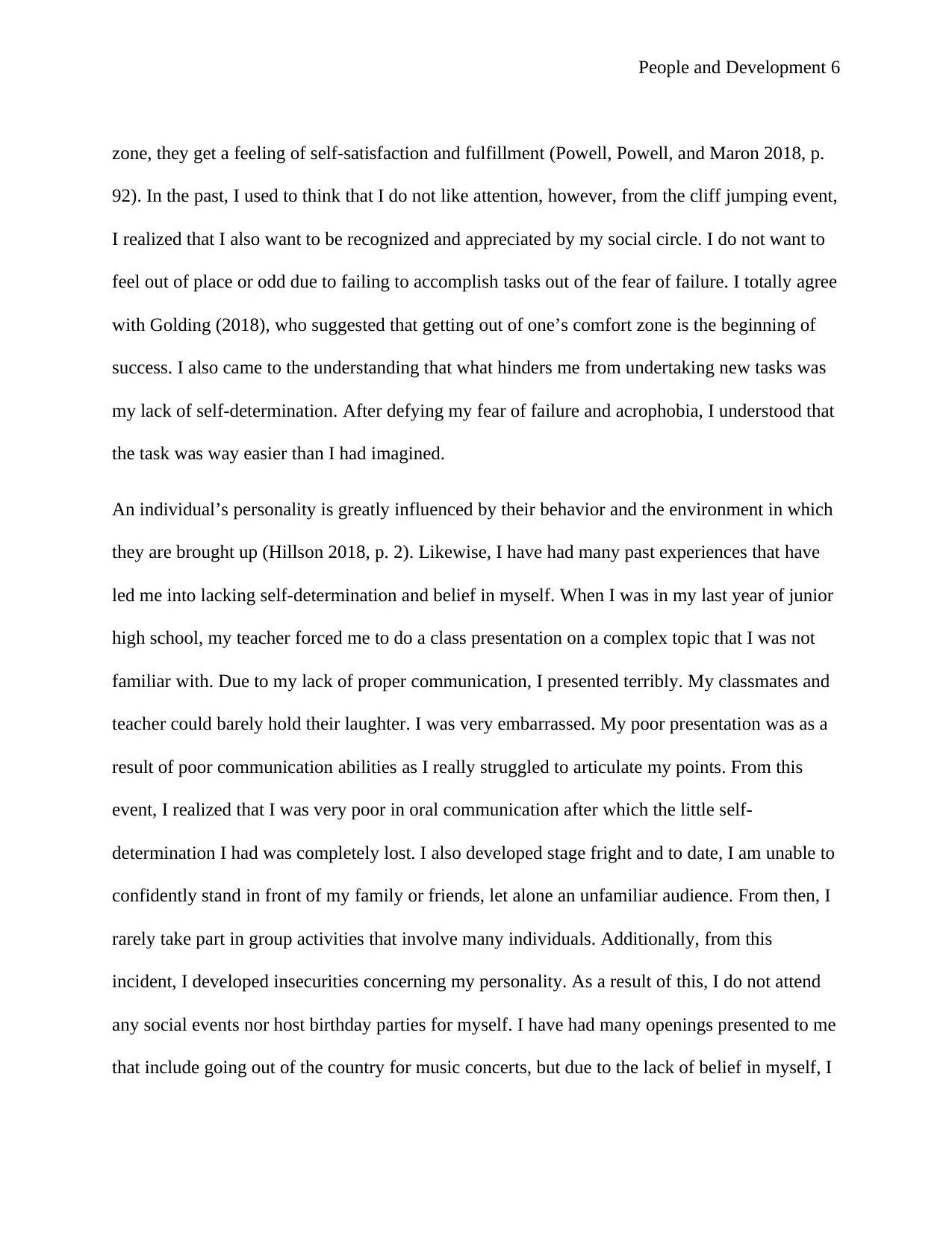
People and Development 6
zone, they get a feeling of self-satisfaction and fulfillment (Powell, Powell, and Maron 2018, p.
92). In the past, I used to think that I do not like attention, however, from the cliff jumping event,
I realized that I also want to be recognized and appreciated by my social circle. I do not want to
feel out of place or odd due to failing to accomplish tasks out of the fear of failure. I totally agree
with Golding (2018), who suggested that getting out of one’s comfort zone is the beginning of
success. I also came to the understanding that what hinders me from undertaking new tasks was
my lack of self-determination. After defying my fear of failure and acrophobia, I understood that
the task was way easier than I had imagined.
An individual’s personality is greatly influenced by their behavior and the environment in which
they are brought up (Hillson 2018, p. 2). Likewise, I have had many past experiences that have
led me into lacking self-determination and belief in myself. When I was in my last year of junior
high school, my teacher forced me to do a class presentation on a complex topic that I was not
familiar with. Due to my lack of proper communication, I presented terribly. My classmates and
teacher could barely hold their laughter. I was very embarrassed. My poor presentation was as a
result of poor communication abilities as I really struggled to articulate my points. From this
event, I realized that I was very poor in oral communication after which the little self-
determination I had was completely lost. I also developed stage fright and to date, I am unable to
confidently stand in front of my family or friends, let alone an unfamiliar audience. From then, I
rarely take part in group activities that involve many individuals. Additionally, from this
incident, I developed insecurities concerning my personality. As a result of this, I do not attend
any social events nor host birthday parties for myself. I have had many openings presented to me
that include going out of the country for music concerts, but due to the lack of belief in myself, I
zone, they get a feeling of self-satisfaction and fulfillment (Powell, Powell, and Maron 2018, p.
92). In the past, I used to think that I do not like attention, however, from the cliff jumping event,
I realized that I also want to be recognized and appreciated by my social circle. I do not want to
feel out of place or odd due to failing to accomplish tasks out of the fear of failure. I totally agree
with Golding (2018), who suggested that getting out of one’s comfort zone is the beginning of
success. I also came to the understanding that what hinders me from undertaking new tasks was
my lack of self-determination. After defying my fear of failure and acrophobia, I understood that
the task was way easier than I had imagined.
An individual’s personality is greatly influenced by their behavior and the environment in which
they are brought up (Hillson 2018, p. 2). Likewise, I have had many past experiences that have
led me into lacking self-determination and belief in myself. When I was in my last year of junior
high school, my teacher forced me to do a class presentation on a complex topic that I was not
familiar with. Due to my lack of proper communication, I presented terribly. My classmates and
teacher could barely hold their laughter. I was very embarrassed. My poor presentation was as a
result of poor communication abilities as I really struggled to articulate my points. From this
event, I realized that I was very poor in oral communication after which the little self-
determination I had was completely lost. I also developed stage fright and to date, I am unable to
confidently stand in front of my family or friends, let alone an unfamiliar audience. From then, I
rarely take part in group activities that involve many individuals. Additionally, from this
incident, I developed insecurities concerning my personality. As a result of this, I do not attend
any social events nor host birthday parties for myself. I have had many openings presented to me
that include going out of the country for music concerts, but due to the lack of belief in myself, I
⊘ This is a preview!⊘
Do you want full access?
Subscribe today to unlock all pages.

Trusted by 1+ million students worldwide
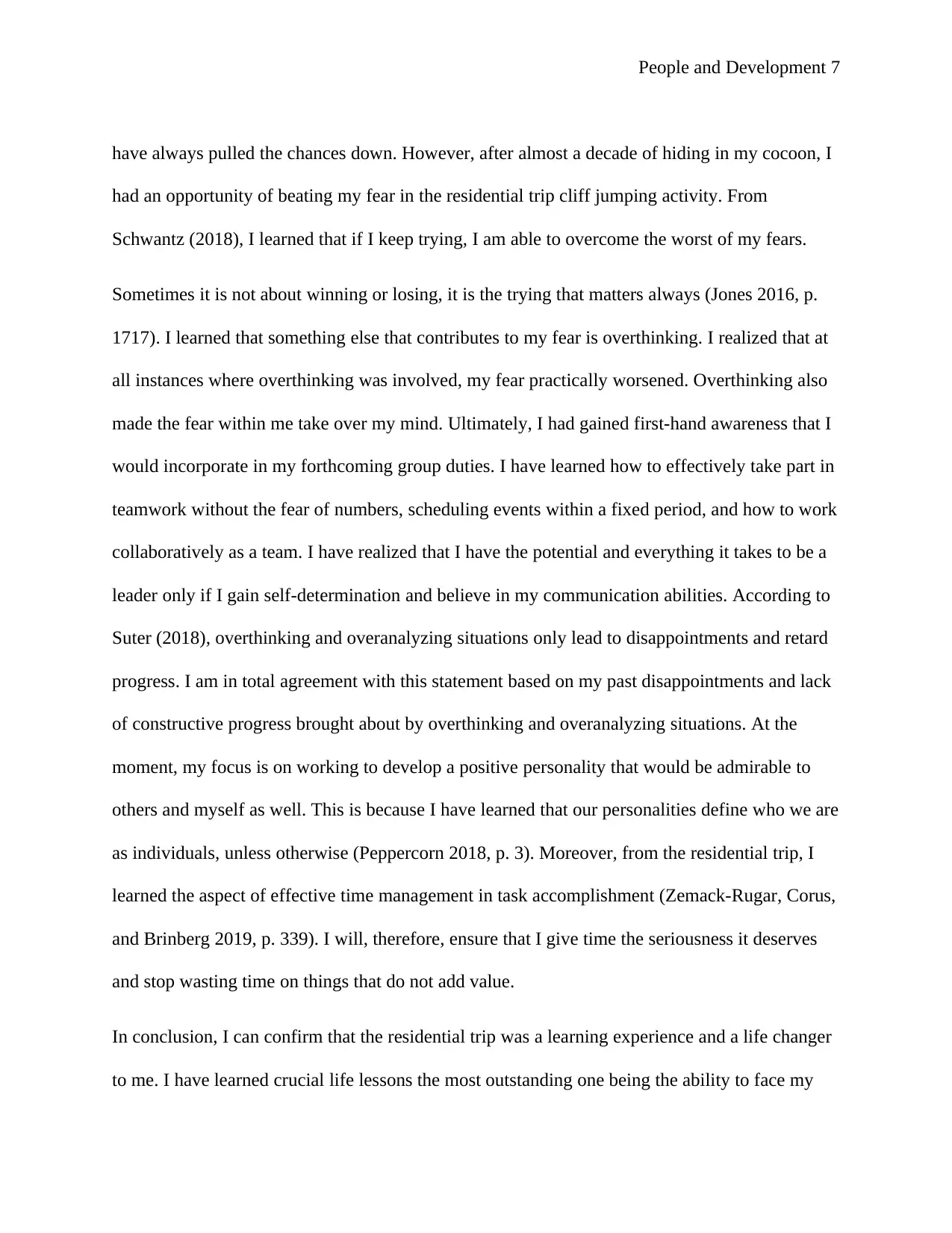
People and Development 7
have always pulled the chances down. However, after almost a decade of hiding in my cocoon, I
had an opportunity of beating my fear in the residential trip cliff jumping activity. From
Schwantz (2018), I learned that if I keep trying, I am able to overcome the worst of my fears.
Sometimes it is not about winning or losing, it is the trying that matters always (Jones 2016, p.
1717). I learned that something else that contributes to my fear is overthinking. I realized that at
all instances where overthinking was involved, my fear practically worsened. Overthinking also
made the fear within me take over my mind. Ultimately, I had gained first-hand awareness that I
would incorporate in my forthcoming group duties. I have learned how to effectively take part in
teamwork without the fear of numbers, scheduling events within a fixed period, and how to work
collaboratively as a team. I have realized that I have the potential and everything it takes to be a
leader only if I gain self-determination and believe in my communication abilities. According to
Suter (2018), overthinking and overanalyzing situations only lead to disappointments and retard
progress. I am in total agreement with this statement based on my past disappointments and lack
of constructive progress brought about by overthinking and overanalyzing situations. At the
moment, my focus is on working to develop a positive personality that would be admirable to
others and myself as well. This is because I have learned that our personalities define who we are
as individuals, unless otherwise (Peppercorn 2018, p. 3). Moreover, from the residential trip, I
learned the aspect of effective time management in task accomplishment (Zemack-Rugar, Corus,
and Brinberg 2019, p. 339). I will, therefore, ensure that I give time the seriousness it deserves
and stop wasting time on things that do not add value.
In conclusion, I can confirm that the residential trip was a learning experience and a life changer
to me. I have learned crucial life lessons the most outstanding one being the ability to face my
have always pulled the chances down. However, after almost a decade of hiding in my cocoon, I
had an opportunity of beating my fear in the residential trip cliff jumping activity. From
Schwantz (2018), I learned that if I keep trying, I am able to overcome the worst of my fears.
Sometimes it is not about winning or losing, it is the trying that matters always (Jones 2016, p.
1717). I learned that something else that contributes to my fear is overthinking. I realized that at
all instances where overthinking was involved, my fear practically worsened. Overthinking also
made the fear within me take over my mind. Ultimately, I had gained first-hand awareness that I
would incorporate in my forthcoming group duties. I have learned how to effectively take part in
teamwork without the fear of numbers, scheduling events within a fixed period, and how to work
collaboratively as a team. I have realized that I have the potential and everything it takes to be a
leader only if I gain self-determination and believe in my communication abilities. According to
Suter (2018), overthinking and overanalyzing situations only lead to disappointments and retard
progress. I am in total agreement with this statement based on my past disappointments and lack
of constructive progress brought about by overthinking and overanalyzing situations. At the
moment, my focus is on working to develop a positive personality that would be admirable to
others and myself as well. This is because I have learned that our personalities define who we are
as individuals, unless otherwise (Peppercorn 2018, p. 3). Moreover, from the residential trip, I
learned the aspect of effective time management in task accomplishment (Zemack-Rugar, Corus,
and Brinberg 2019, p. 339). I will, therefore, ensure that I give time the seriousness it deserves
and stop wasting time on things that do not add value.
In conclusion, I can confirm that the residential trip was a learning experience and a life changer
to me. I have learned crucial life lessons the most outstanding one being the ability to face my
Paraphrase This Document
Need a fresh take? Get an instant paraphrase of this document with our AI Paraphraser
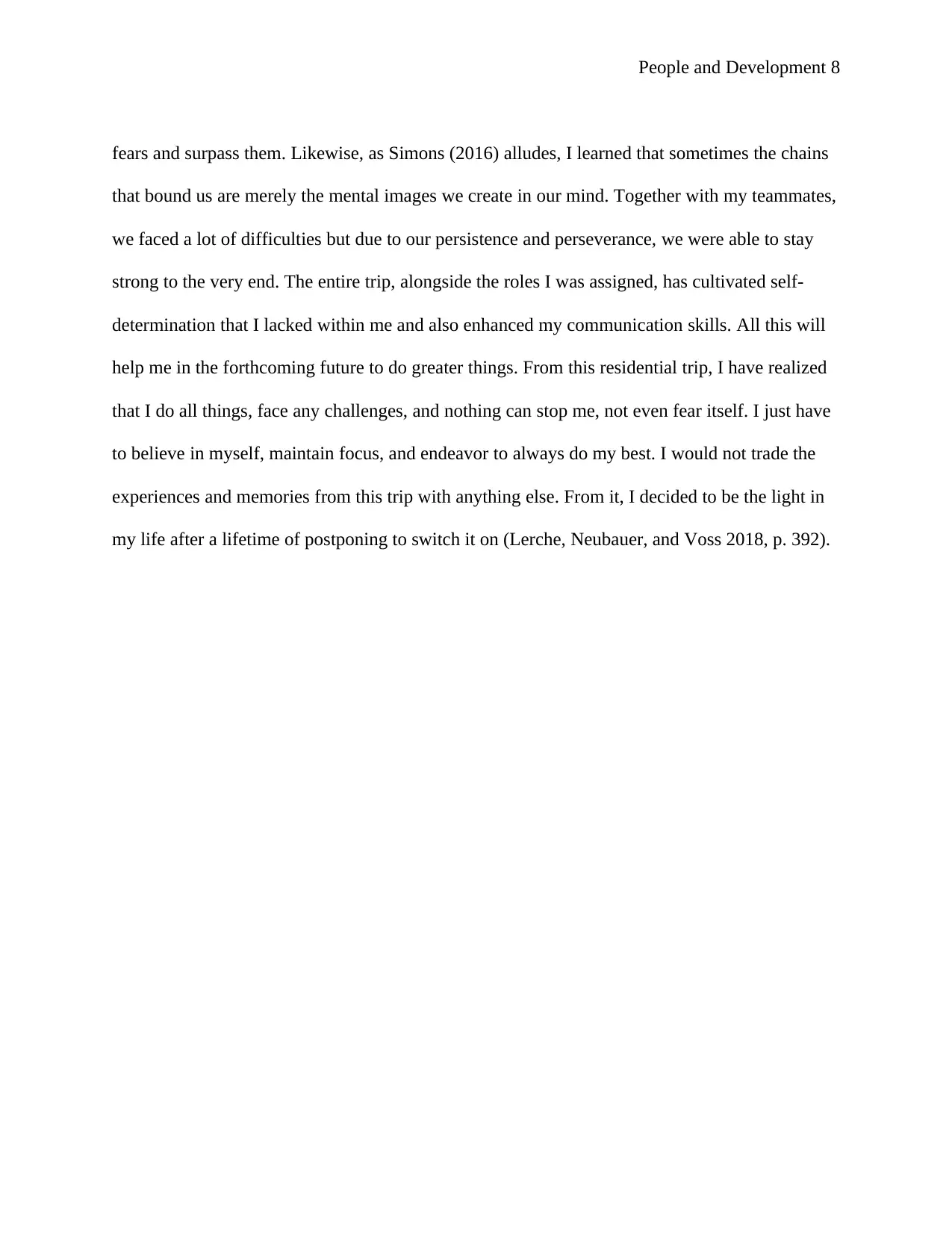
People and Development 8
fears and surpass them. Likewise, as Simons (2016) alludes, I learned that sometimes the chains
that bound us are merely the mental images we create in our mind. Together with my teammates,
we faced a lot of difficulties but due to our persistence and perseverance, we were able to stay
strong to the very end. The entire trip, alongside the roles I was assigned, has cultivated self-
determination that I lacked within me and also enhanced my communication skills. All this will
help me in the forthcoming future to do greater things. From this residential trip, I have realized
that I do all things, face any challenges, and nothing can stop me, not even fear itself. I just have
to believe in myself, maintain focus, and endeavor to always do my best. I would not trade the
experiences and memories from this trip with anything else. From it, I decided to be the light in
my life after a lifetime of postponing to switch it on (Lerche, Neubauer, and Voss 2018, p. 392).
fears and surpass them. Likewise, as Simons (2016) alludes, I learned that sometimes the chains
that bound us are merely the mental images we create in our mind. Together with my teammates,
we faced a lot of difficulties but due to our persistence and perseverance, we were able to stay
strong to the very end. The entire trip, alongside the roles I was assigned, has cultivated self-
determination that I lacked within me and also enhanced my communication skills. All this will
help me in the forthcoming future to do greater things. From this residential trip, I have realized
that I do all things, face any challenges, and nothing can stop me, not even fear itself. I just have
to believe in myself, maintain focus, and endeavor to always do my best. I would not trade the
experiences and memories from this trip with anything else. From it, I decided to be the light in
my life after a lifetime of postponing to switch it on (Lerche, Neubauer, and Voss 2018, p. 392).
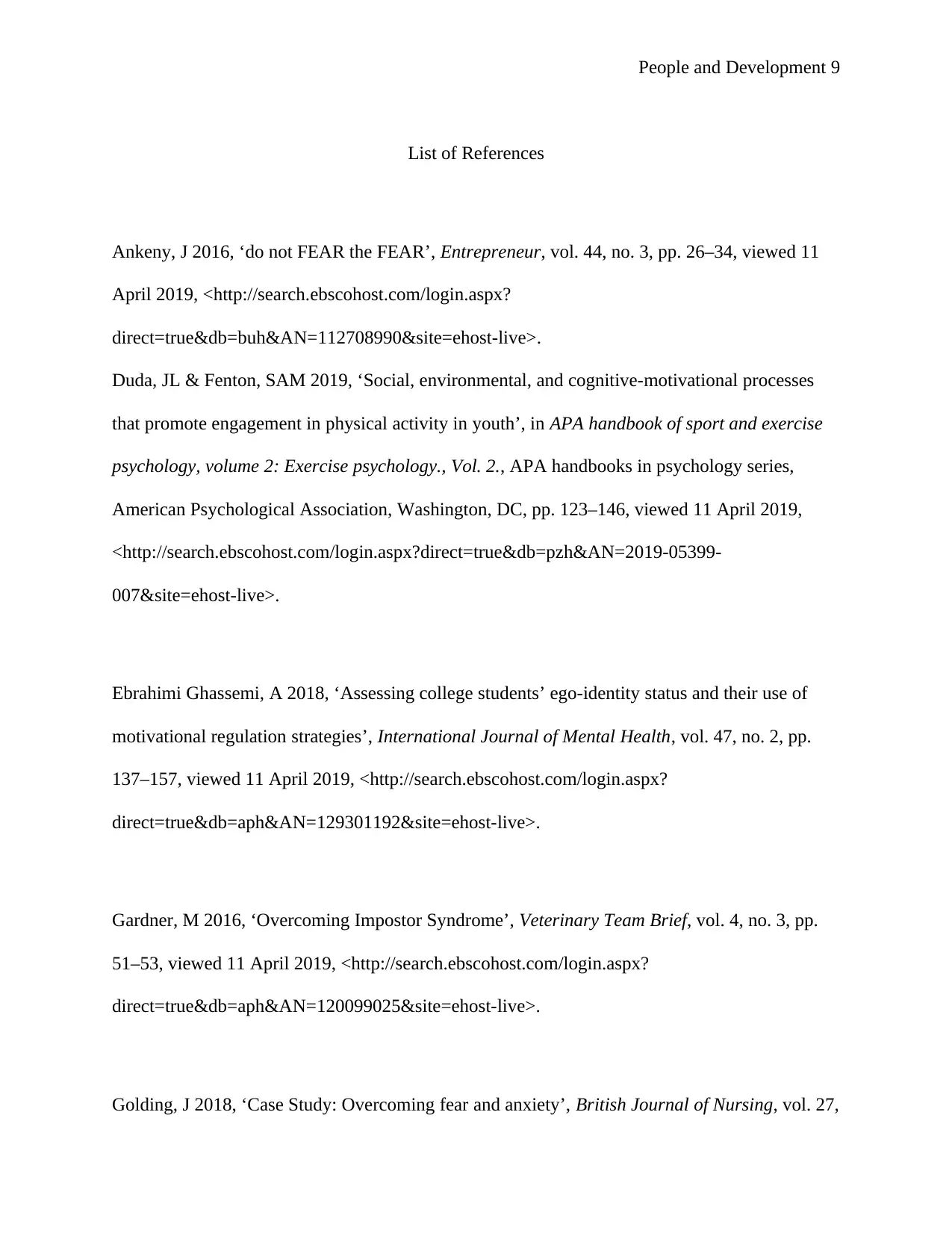
People and Development 9
List of References
Ankeny, J 2016, ‘do not FEAR the FEAR’, Entrepreneur, vol. 44, no. 3, pp. 26–34, viewed 11
April 2019, <http://search.ebscohost.com/login.aspx?
direct=true&db=buh&AN=112708990&site=ehost-live>.
Duda, JL & Fenton, SAM 2019, ‘Social, environmental, and cognitive-motivational processes
that promote engagement in physical activity in youth’, in APA handbook of sport and exercise
psychology, volume 2: Exercise psychology., Vol. 2., APA handbooks in psychology series,
American Psychological Association, Washington, DC, pp. 123–146, viewed 11 April 2019,
<http://search.ebscohost.com/login.aspx?direct=true&db=pzh&AN=2019-05399-
007&site=ehost-live>.
Ebrahimi Ghassemi, A 2018, ‘Assessing college students’ ego-identity status and their use of
motivational regulation strategies’, International Journal of Mental Health, vol. 47, no. 2, pp.
137–157, viewed 11 April 2019, <http://search.ebscohost.com/login.aspx?
direct=true&db=aph&AN=129301192&site=ehost-live>.
Gardner, M 2016, ‘Overcoming Impostor Syndrome’, Veterinary Team Brief, vol. 4, no. 3, pp.
51–53, viewed 11 April 2019, <http://search.ebscohost.com/login.aspx?
direct=true&db=aph&AN=120099025&site=ehost-live>.
Golding, J 2018, ‘Case Study: Overcoming fear and anxiety’, British Journal of Nursing, vol. 27,
List of References
Ankeny, J 2016, ‘do not FEAR the FEAR’, Entrepreneur, vol. 44, no. 3, pp. 26–34, viewed 11
April 2019, <http://search.ebscohost.com/login.aspx?
direct=true&db=buh&AN=112708990&site=ehost-live>.
Duda, JL & Fenton, SAM 2019, ‘Social, environmental, and cognitive-motivational processes
that promote engagement in physical activity in youth’, in APA handbook of sport and exercise
psychology, volume 2: Exercise psychology., Vol. 2., APA handbooks in psychology series,
American Psychological Association, Washington, DC, pp. 123–146, viewed 11 April 2019,
<http://search.ebscohost.com/login.aspx?direct=true&db=pzh&AN=2019-05399-
007&site=ehost-live>.
Ebrahimi Ghassemi, A 2018, ‘Assessing college students’ ego-identity status and their use of
motivational regulation strategies’, International Journal of Mental Health, vol. 47, no. 2, pp.
137–157, viewed 11 April 2019, <http://search.ebscohost.com/login.aspx?
direct=true&db=aph&AN=129301192&site=ehost-live>.
Gardner, M 2016, ‘Overcoming Impostor Syndrome’, Veterinary Team Brief, vol. 4, no. 3, pp.
51–53, viewed 11 April 2019, <http://search.ebscohost.com/login.aspx?
direct=true&db=aph&AN=120099025&site=ehost-live>.
Golding, J 2018, ‘Case Study: Overcoming fear and anxiety’, British Journal of Nursing, vol. 27,
⊘ This is a preview!⊘
Do you want full access?
Subscribe today to unlock all pages.

Trusted by 1+ million students worldwide
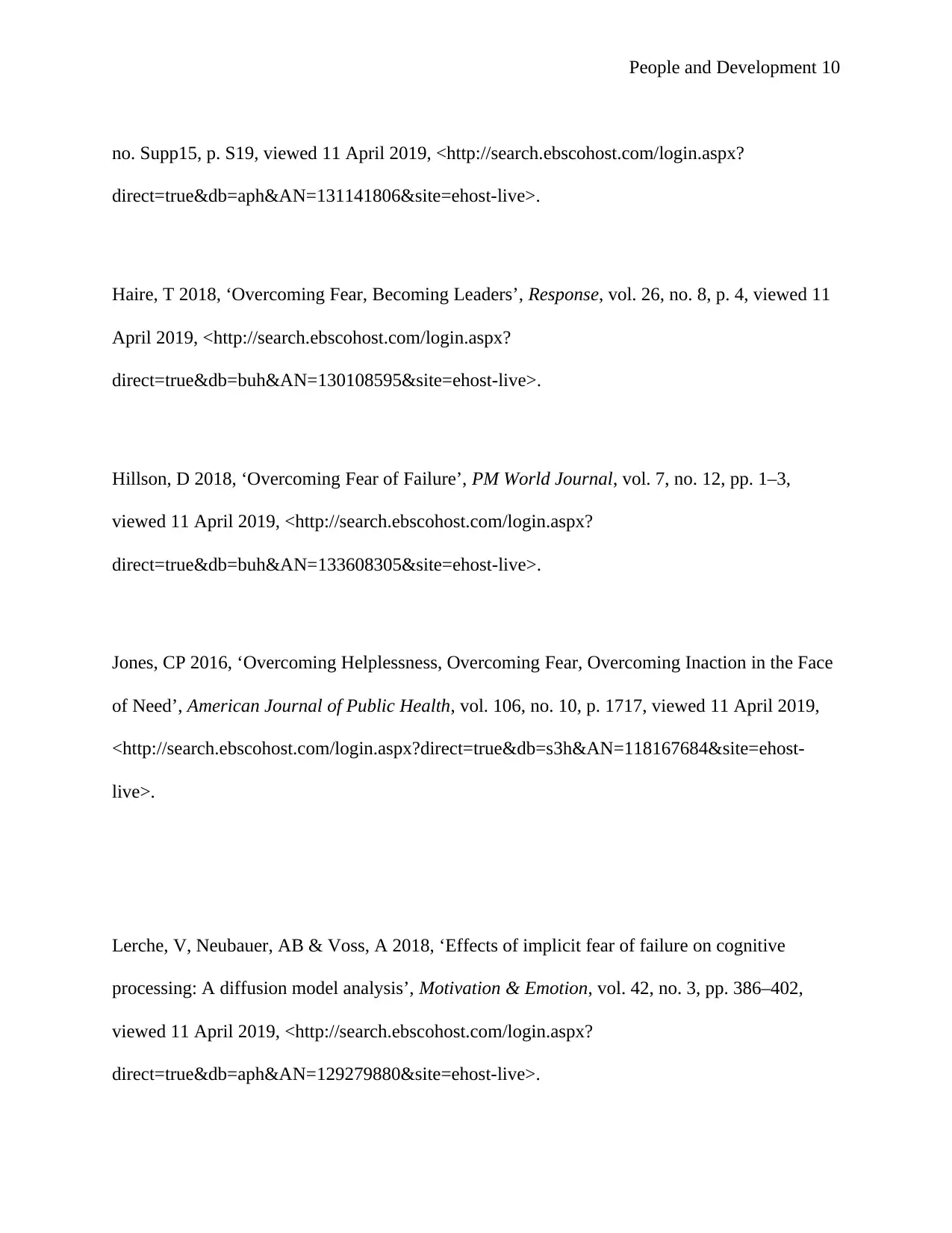
People and Development 10
no. Supp15, p. S19, viewed 11 April 2019, <http://search.ebscohost.com/login.aspx?
direct=true&db=aph&AN=131141806&site=ehost-live>.
Haire, T 2018, ‘Overcoming Fear, Becoming Leaders’, Response, vol. 26, no. 8, p. 4, viewed 11
April 2019, <http://search.ebscohost.com/login.aspx?
direct=true&db=buh&AN=130108595&site=ehost-live>.
Hillson, D 2018, ‘Overcoming Fear of Failure’, PM World Journal, vol. 7, no. 12, pp. 1–3,
viewed 11 April 2019, <http://search.ebscohost.com/login.aspx?
direct=true&db=buh&AN=133608305&site=ehost-live>.
Jones, CP 2016, ‘Overcoming Helplessness, Overcoming Fear, Overcoming Inaction in the Face
of Need’, American Journal of Public Health, vol. 106, no. 10, p. 1717, viewed 11 April 2019,
<http://search.ebscohost.com/login.aspx?direct=true&db=s3h&AN=118167684&site=ehost-
live>.
Lerche, V, Neubauer, AB & Voss, A 2018, ‘Effects of implicit fear of failure on cognitive
processing: A diffusion model analysis’, Motivation & Emotion, vol. 42, no. 3, pp. 386–402,
viewed 11 April 2019, <http://search.ebscohost.com/login.aspx?
direct=true&db=aph&AN=129279880&site=ehost-live>.
no. Supp15, p. S19, viewed 11 April 2019, <http://search.ebscohost.com/login.aspx?
direct=true&db=aph&AN=131141806&site=ehost-live>.
Haire, T 2018, ‘Overcoming Fear, Becoming Leaders’, Response, vol. 26, no. 8, p. 4, viewed 11
April 2019, <http://search.ebscohost.com/login.aspx?
direct=true&db=buh&AN=130108595&site=ehost-live>.
Hillson, D 2018, ‘Overcoming Fear of Failure’, PM World Journal, vol. 7, no. 12, pp. 1–3,
viewed 11 April 2019, <http://search.ebscohost.com/login.aspx?
direct=true&db=buh&AN=133608305&site=ehost-live>.
Jones, CP 2016, ‘Overcoming Helplessness, Overcoming Fear, Overcoming Inaction in the Face
of Need’, American Journal of Public Health, vol. 106, no. 10, p. 1717, viewed 11 April 2019,
<http://search.ebscohost.com/login.aspx?direct=true&db=s3h&AN=118167684&site=ehost-
live>.
Lerche, V, Neubauer, AB & Voss, A 2018, ‘Effects of implicit fear of failure on cognitive
processing: A diffusion model analysis’, Motivation & Emotion, vol. 42, no. 3, pp. 386–402,
viewed 11 April 2019, <http://search.ebscohost.com/login.aspx?
direct=true&db=aph&AN=129279880&site=ehost-live>.
Paraphrase This Document
Need a fresh take? Get an instant paraphrase of this document with our AI Paraphraser
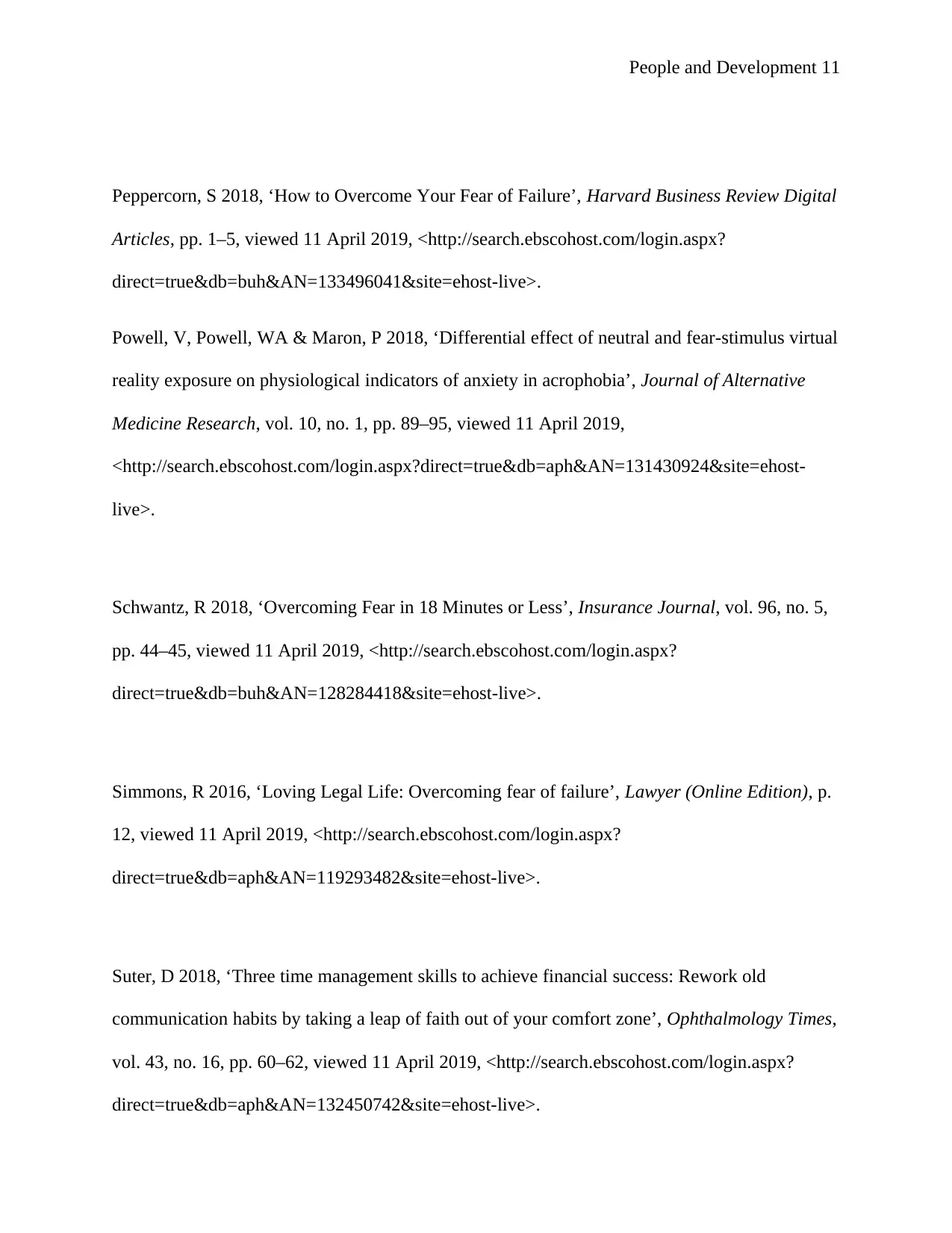
People and Development 11
Peppercorn, S 2018, ‘How to Overcome Your Fear of Failure’, Harvard Business Review Digital
Articles, pp. 1–5, viewed 11 April 2019, <http://search.ebscohost.com/login.aspx?
direct=true&db=buh&AN=133496041&site=ehost-live>.
Powell, V, Powell, WA & Maron, P 2018, ‘Differential effect of neutral and fear-stimulus virtual
reality exposure on physiological indicators of anxiety in acrophobia’, Journal of Alternative
Medicine Research, vol. 10, no. 1, pp. 89–95, viewed 11 April 2019,
<http://search.ebscohost.com/login.aspx?direct=true&db=aph&AN=131430924&site=ehost-
live>.
Schwantz, R 2018, ‘Overcoming Fear in 18 Minutes or Less’, Insurance Journal, vol. 96, no. 5,
pp. 44–45, viewed 11 April 2019, <http://search.ebscohost.com/login.aspx?
direct=true&db=buh&AN=128284418&site=ehost-live>.
Simmons, R 2016, ‘Loving Legal Life: Overcoming fear of failure’, Lawyer (Online Edition), p.
12, viewed 11 April 2019, <http://search.ebscohost.com/login.aspx?
direct=true&db=aph&AN=119293482&site=ehost-live>.
Suter, D 2018, ‘Three time management skills to achieve financial success: Rework old
communication habits by taking a leap of faith out of your comfort zone’, Ophthalmology Times,
vol. 43, no. 16, pp. 60–62, viewed 11 April 2019, <http://search.ebscohost.com/login.aspx?
direct=true&db=aph&AN=132450742&site=ehost-live>.
Peppercorn, S 2018, ‘How to Overcome Your Fear of Failure’, Harvard Business Review Digital
Articles, pp. 1–5, viewed 11 April 2019, <http://search.ebscohost.com/login.aspx?
direct=true&db=buh&AN=133496041&site=ehost-live>.
Powell, V, Powell, WA & Maron, P 2018, ‘Differential effect of neutral and fear-stimulus virtual
reality exposure on physiological indicators of anxiety in acrophobia’, Journal of Alternative
Medicine Research, vol. 10, no. 1, pp. 89–95, viewed 11 April 2019,
<http://search.ebscohost.com/login.aspx?direct=true&db=aph&AN=131430924&site=ehost-
live>.
Schwantz, R 2018, ‘Overcoming Fear in 18 Minutes or Less’, Insurance Journal, vol. 96, no. 5,
pp. 44–45, viewed 11 April 2019, <http://search.ebscohost.com/login.aspx?
direct=true&db=buh&AN=128284418&site=ehost-live>.
Simmons, R 2016, ‘Loving Legal Life: Overcoming fear of failure’, Lawyer (Online Edition), p.
12, viewed 11 April 2019, <http://search.ebscohost.com/login.aspx?
direct=true&db=aph&AN=119293482&site=ehost-live>.
Suter, D 2018, ‘Three time management skills to achieve financial success: Rework old
communication habits by taking a leap of faith out of your comfort zone’, Ophthalmology Times,
vol. 43, no. 16, pp. 60–62, viewed 11 April 2019, <http://search.ebscohost.com/login.aspx?
direct=true&db=aph&AN=132450742&site=ehost-live>.

People and Development 12
Zemack-Rugar, Y, Corus, C & Brinberg, D 2019, ‘If at First You Do Succeed, Do You Try, Try
Again? Developing the Persistence–Licensing Response Measure to Understand, Predict, and
Modify Behavior Following Subgoal Success’, Journal of Marketing Research (JMR), vol. 56,
no. 2, pp. 324–344, viewed 11 April 2019, <http://search.ebscohost.com/login.aspx?
direct=true&db=buh&AN=135518788&site=ehost-live>.
Zemack-Rugar, Y, Corus, C & Brinberg, D 2019, ‘If at First You Do Succeed, Do You Try, Try
Again? Developing the Persistence–Licensing Response Measure to Understand, Predict, and
Modify Behavior Following Subgoal Success’, Journal of Marketing Research (JMR), vol. 56,
no. 2, pp. 324–344, viewed 11 April 2019, <http://search.ebscohost.com/login.aspx?
direct=true&db=buh&AN=135518788&site=ehost-live>.
⊘ This is a preview!⊘
Do you want full access?
Subscribe today to unlock all pages.

Trusted by 1+ million students worldwide
1 out of 12
Related Documents
Your All-in-One AI-Powered Toolkit for Academic Success.
+13062052269
info@desklib.com
Available 24*7 on WhatsApp / Email
![[object Object]](/_next/static/media/star-bottom.7253800d.svg)
Unlock your academic potential
Copyright © 2020–2026 A2Z Services. All Rights Reserved. Developed and managed by ZUCOL.





